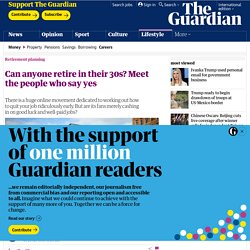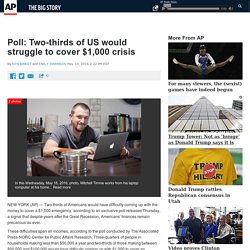

Food. Energy. Information. Ownership vs Access. Can anyone retire in their 30s? Meet the people who say yes. When did you start thinking seriously about preparing financially for your retirement?

Not yet? Many people never do. One in three adults in the UK have no private pension, and will rely on the state pension in old age. Even those who do start saving usually only get round to it in their 40s and 50s, upping their pension contributions in the hope of retiring in their 60s. But there is a new breed of supersavers who have no intention of waiting that long. The Financial Independence, Retire Early (Fire) movement originated in the US, but has spread to the UK, attracting twenty- and thirtysomethings who do not intend to spend 40 years strapped to the corporate machine.
Jordan Hall is 24 and a fully paid-up member of the movement, eagerly following blogs from the likes of Mr Money Mustache in the US and the Escape Artist in the UK. Hall says it’s a question of being organised, not miserly. He says his family and friends thought he was mad. “My favourite debate!” Beyond Wealth; Inequality Drives Consumption Patterns.
That equality matters in terms of health and happiness has been clear for some years.

But it is also better for the environment. The evidence (which is still emerging) suggests the most unequal affluent countries contribute more to climate change via pollution than their more equal counterparts. A large section of their people may suffer more, too. A new report predicts the United States will see its levels of economic inequality increase due to the uneven geographical effects of climate change – resulting in “the largest transfer of wealth from the poor to the rich in the country’s history”, according the study’s lead author. The Future of Banking Depends On Open Banking APIs. Organizations in all industries are battling for customers based on providing a superior customer experience. The banking industry is no exception. In fact, as digital banking applications have grabbed a greater share of customer transactions, the need to provide an easy-to-use, frictionless experience, with new digital services offered across a greater number of touchpoints has never been greater.
To satisfy these increased expectations, financial technology firms (fintechs) have entered the financial services marketplace. While most of this competition has not achieved significant scale, that shouldn’t signal that these solutions are not important to the industry. Poll: Two-Thirds of US Would Struggle to Cover $1,000 Crisis. NEW YORK (AP) — Two-thirds of Americans would have difficulty coming up with the money to cover a $1,000 emergency, according to an exclusive poll released Thursday, a signal that despite years after the Great Recession, Americans' finances remain precarious as ever.

These difficulties span all incomes, according to the poll conducted by The Associated Press-NORC Center for Public Affairs Research. Three-quarters of people in households making less than $50,000 a year and two-thirds of those making between $50,000 and $100,000 would have difficulty coming up with $1,000 to cover an unexpected bill. Even for the country's wealthiest 20 percent — households making more than $100,000 a year — 38 percent say they would have at least some difficulty coming up with $1,000. "The more we learn about the balance sheets of Americans, it becomes quite alarming," said Caroline Ratcliffe, a senior fellow at the Urban Institute focusing on poverty and emergency savings issues.
How Amazon’s ‘Invisible’ Hand Can Shape Cities. Why the Cost of Living Is Poised to Plummet in the Next 20 Years. People are concerned about how AI and robotics are taking jobs, destroying livelihoods, reducing our earning capacity, and subsequently destroying the economy.

In anticipation, countries like Canada, India and Finland are running experiments to pilot the idea of "universal basic income" — the unconditional provision of a regular sum of money from the government to support livelihood independent of employment. But what people aren't talking about, and what's getting my attention, is a forthcoming rapid demonetization of the cost of living. Meaning — it's getting cheaper and cheaper to meet our basic needs. Powered by developments in exponential technologies, the cost of housing, transportation, food, health care, entertainment, clothing, education and so on will fall, eventually approaching, believe it or not, zero.
In this blog, I'll explore how people spend their money now and how "technological socialism" (i.e., having our lives taken care of by technology) can demonetize living. (2) Food. Using Open Source Design to Address Climate Change. A growing movement that combines open source design with sustainability is creating an exciting alternative to profit-driven, proprietary sustainability products.

As we face urgent issues like climate change, the ability of open source communities to quickly and inexpensively create solutions makes increasing sense. One project that clearly recognizes this big opportunity for impact is POC21, an international innovation network whose participants create open-source, sustainability-related products like the 30$ Wind Turbine, Aker (open source urban gardening infrastructure), and Faircap (open source portable water filter). Co-organized by Ouishare co-founder Benjamin Tincq, POC21 has brought together hundreds of designers, makers and organizers to “prototype the fossil free, zero waste society.” An open approach to design and production will allow for the biggest teams possible to create solutions in as little time as possible. 1. 2. 3. 4. Bicitractor prototype at POC21.